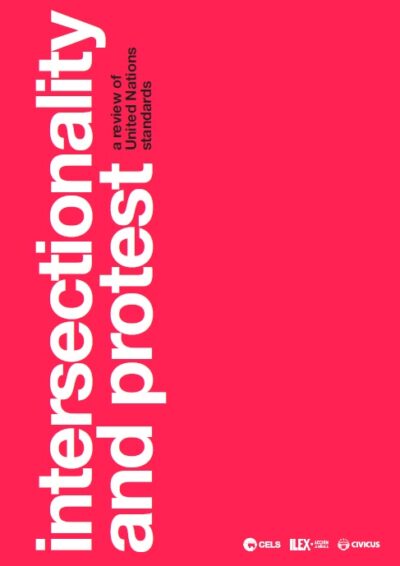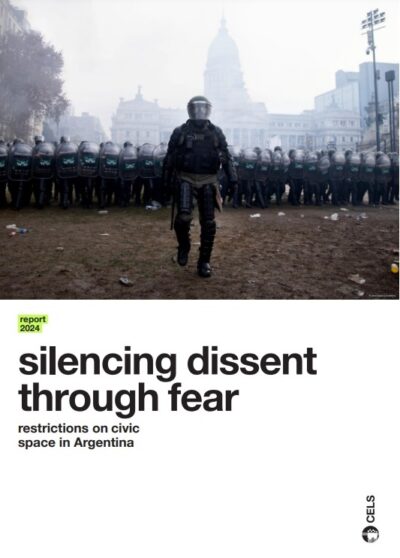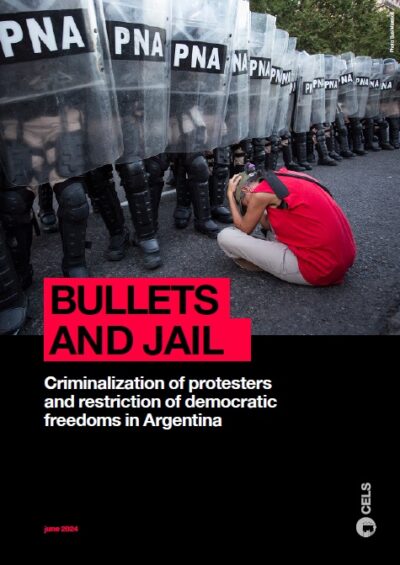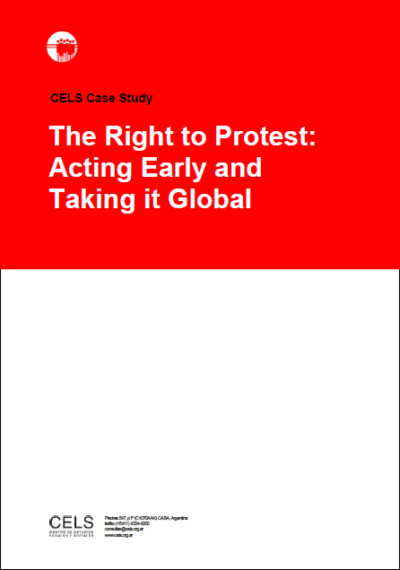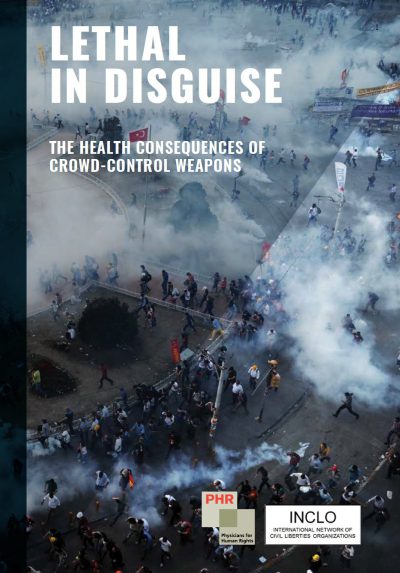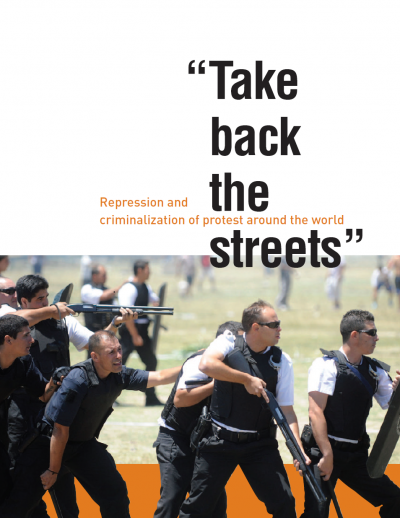2024 IACHR Report: Human Rights in Argentina
Deterioration in the right to protest and freedom of expression, rollback of memory policies, weakening of protections for LGBTIQ+ rights, austerity measures affecting pensioners, and a rise in child poverty, are among the critical issues the Commission warned about in its annual report. We summarize the Commission’s key findings.
Repression as policy: Violence, arbitrary detentions, and the use of dangerous weapons in Argentina
The mobilization outside Congress demanding a pension increase on March 12 was violently repressed in a large-scale operation involving five security forces. Security Minister Patricia Bullrich had warned in advance that there would be repression. Tear gas, rubber bullets, and arbitrary detentions marked a day in which the government justified its actions by invoking the narrative of an “attempted coup.”
UN: we denounced the restrictions on civic space and the unconstitutionality of the IMF loan at the human rights council
During the 58th session of the Human Rights Council, CELS participated in two interactive dialogues with Special Rapporteurs to present on the current situation in Argentina.
IACHR Hearing: State denies responsibility for December 2001 killings and repression
The Argentine State withdrew its previous acknowledgment of responsibility for the repression carried out in 2001, which it had accepted in 2023. Officials declined to answer questions regarding the State’s new assessment of the events that occurred in December 2001. The events of December 19 and 20, 2001, were an extreme manifestation of state violence following the unjustified declaration of a State of Siege.
Intersectionality and protest
Autor/a: CELS, ILEX, CIVICUS
16 pages
ver más
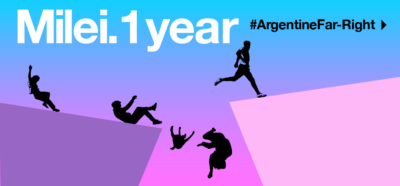
Silencing dissent through fear. Restrictions on civic space in Argentina
Autor/a: CELS
10 pages
ver más
From head to toe: the criminal use of less lethal weapons in social protests in Latin America
Autor/a: CELS & Temblores
51 pags.
ver más
Bullets and jail: Criminalization of protesters and restriction of democratic freedoms in Argentina
Autor/a: CELS
14 pages
ver más
We denounced the restrictions on the right to protest before the IACHR and the UN: detentions combined with an arbitrary and dangerous escalation of punitive measures
This came after the repression of thislast week’s protest against the “Bases and Starting Points for the Freedom of Argentines” Bill in Congress. More than 30 people were arbitrarily detained and later accused by the prosecution of serious crimes against democratic order, echoing the government’s accusations of terrorism and an attempt to overthrow the government.
CELS goes before the UN to denounce setbacks in rights to protest, housing and the impact of Argentina’s debt
The denouncement was made during the 55th session of the Human Rights Council in Geneva, Switzerland. We spoke with special rapporteurs about how the government’s economic and social policies degrade the living conditions of the majority of Argentines.
Repression at the Congress: we call on the IACHR to protect the right to protest
Together with human rights defender organizations, we asked that the Inter-American Commission on Human Rights (IACHR) take precautionary measures in favor of press workers, human rights defenders, and protesters. We expressed our deep concern about the recurrence of disproportionate security operations that result in people being detained and seriously injured.
UN urges government to review the omnibus bill and protocol, saying they criminalize protest
The special rapporteurs expressed their concern over the Ministry of Security resolution and proposed legal reforms criminalizing protest. They called on the Argentine State to comply with international human rights standards.
On Milei’s “omnibus bill”
The Argentine government led by Javier Milei seeks to dismantle essential procedures and implement regressive measures affecting human rights and democracy. Within a span of three weeks, from Decree 70/23 to the proposed “Bases…” law, the Executive Branch introduced 1649 articles altering the entire social and political landscape, protection parameters, and state architecture. Congress bears the political responsibility to refrain from validating it.
We submit that the Judiciary declare President Milei’s DNU 70/2023 unconstitutional
We filed a petition with Argentina’s federal administrative court. It is our view that the decree violates the separation of powers, suppressing or restricting individual and collective rights and guarantees. We underscore that the DNU’s submission by the executive power breaches constitutional rules, usurping powers that are prohibited to him and reserved for the National Congress.
With more than 1,700 signatures from organizations, we condemn the protocol against protest before the UN and the IACHR
Jointly with trade unions, social movements, human rights organizations, and entities focused on social, trade, environmental, indigenous, migrant, transfeminist, religious, children’s, student, and political causes, we have requested international mechanisms to demand the Argentine State stop the implementation of new regulations that seek to restrict and repress public protest. These submissions were also supported by 15,000 individual signatures.
Limitations on the right to protest in Jujuy
This week, human rights organizations submitted a letter to the Constituent Convention expressing our concern about the proposed human rights setbacks in the province’s constitutional reform. The process has been conducted with unreasonably tight deadlines, lacking the necessary participation and debate, and raising concerns about its legality and legitimacy. This reform will have a detrimental impact on the right to protest, among others.
Brazil: the threat of the anti-democratic far right
The move to action by these groups is a call for reflection and urgent action. What happens when democracies provide the tools and possibilities for some groups to seek to limit or do away with those same democracies? And what tools do we have to defend democracy in the face of attacks like this one?
Indigenous peoples: the state fails to meet its commitments and backslides in response to racist pressure
Despite having the right to ownership and possession of their ancestral territories, this right is not enforced nor are there policies in place to guarantee that Indigenous people can live out their lives in keeping with their identity. The progress made in recent decades has not been sufficient. State response is often couched in rhetoric and stigmatizing stereotypes. The growing number of complaints is linked to this historic debt.
Right to protest: meeting of Latin American organizations
On July 25-27 we held an event in Buenos Aires to debate current reality in our region with colleagues from Brazil, Colombia, Chile, Honduras, Ecuador and Mexico.
Colombia: Call for the End of State Violence and for the IACHR to Investigate on Acts of Repression
650 civil society organizations call for a thorough investigation of the repression of social protest and request an on-site visit by the IACHR and the creation of a group of experts.
The UN Human Rights Committee’s Interpretation of Freedom of Assembly Puts Existing Protections at Risk
Organizations from across the Americas warn the Human Rights Committee about the risks of regressive standards of protection on the right to protest.
Chile: Final Report of The International Human Rights Observation Mission
The collaborative document provides an account of generalized human rights violations perpetrated by state agents between October 18 and December 31, 2019. It also highlights that the violence unfolded by security forces was exacerbated by the president’s suspension of the Constitution.
The Consequences of Less-Lethal Weapons in Chile
Since the beginning of the demonstrations in Chile, over 2800 protesters have been injured, among which 1180 by rubber bullets and pellets.
Chile: Preliminary report by an international human rights mission
The mission visited Santiago, Valparaíso and Temuco to meet with human rights and civil society organizations and other groups, as well as state institutions. The initial result is a report that provides a survey of human rights violations and recommendations for the Chilean state.
Intimidation of Brazilian human rights defenders engaging with the UN
During two side events at the United Nations, Jean Wyllys and Luciana Zaffalon were intimidated by Brazilian officials.
The impact of new authoritarianism on human rights
Representatives of various organizations gathered in Geneva discussed the situation in the United States, the Philippines and Brazil, in light of authoritarian governments that have a sharp anti-rights discourse.
8 years since the Cárcova massacre: impunity for police chiefs
Throughout this period, the judiciary has failed to investigate the criminal responsibilities of those who led the operation.
Defending Dissent: Report launch at the UN Human Rights Council
Joint research by the International Network of Civil Liberties Organizations (INCLO) and the International Human Rights Clinic of the University of Chicago Law School (IHRC) offers practical guidance on how law enforcement can protect human rights when policing protests.
UN Human Rights Council urged to investigate violence in Palestine
“Enough is Enough”: 95 civil society organizations call on the UN Human Rights Council to urgently launch a Commission of Inquiry to investigate violence against protesters in Palestine.
Social protest: Police violence against photographers and journalists
The SiPreBA media workers trade union and CELS published a report documenting cases of people injured, detained and charged with crimes while documenting protests in 2017.
One month since the repression of December 14
Seven people remain detained over incidents related to the protests of December 14 and 18, in the framework of criminal cases filed at the federal level. These prolonged detentions based on weak arguments imply very worrisome processes of criminalization. This situation also worsens the deterioration of conditions in which criminal processes unfold, hindering the right to defense.
Protest, social movements and state crackdowns
A fresh round of content published on our Right to Protest platform covers ground across the world: from Kenya, Hungary and Australia to Peru, Canada and Argentina. The threats to this fundamental right can be seen on the street, with violent repressions, and in terms of state surveillance and judicial persecution. This online project was developed by openDemocracy, CELS and INCLO, with support from the ACLU.
Milagro Sala: IACHR requests Inter-American Court intervention since state failed to comply with precautionary measure
The Inter-American Commission on Human Rights (IACHR) indicated that “the conditions of extreme gravity, urgency and risk of irreparable damage” set forth in the American Convention on Human Rights have been met.
Milagro Sala: The risks increase as Argentina flouts the IACHR’s precautionary measure
At a working meeting convened by the Inter-American Commission on Human Rights (IACHR), representatives of Amnesty International and CELS warned that the risks she runs have intensified.
Regarding the discovery of a body in the Chubut river
We echo the request of Santiago Maldonado’s family to wait until the proper identification procedures have been carried out. The Argentine state must fulfill its obligation to guarantee an investigation that leads to truth and justice.
The Right to Protest worldwide
We are unveiling an online platform that brings together original articles, videos and interviews on the right to protest, at a time when demonstrations are proliferating worldwide and states often respond with violence. This project was developed by openDemocracy, CELS and INCLO, with support from the ACLU.
Press conference on Santiago Maldonado’s disappearance
A press conference was held in Esquel, 35 days after Santiago Maldonado’s disappearance. The participants emphasized the investigation’s shortcomings in the first crucial days, the violent security force operation in which Santiago disappeared, and the hypotheses used to try to divert the case.
Ten days since Santiago Maldonado disappeared in Argentina
Today marks 10 days since Santiago Maldonado was last seen trying to escape from an operation by Argentina’s Gendarmerie in the territory of the Pu Lof Cushamen indigenous community, in Chubut province. Human rights organizations convened a massive rally in the Plaza de Mayo today to demand that he be found alive.
The Right to Protest: Acting Early and Taking it Global
Autor/a: CELS
5 pgs.
ver más
IACHR: Repression and criminalization of social protest in Jujuy
The Argentine state was called to appear before the IACHR to give its response regarding the repression and criminalization of social protest in Jujuy. In that province criminal, misdemeanor and administrative proceedings are used to limit the right to protest, freedom of expression and freedom of association.
Milagro Sala: One year of arbitrary detention
Joint press release by CELS, Amnistía Internacional and ANDHES.
Ministry of Security petitioned over repression of Mapuche community
In three separate operations, national and provincial security forces used unusual violence to repress members of the Lof Cushamen Mapuche community of Chubut, who have been subjected to criminalization and harassment.
Brutal police operation and torture of Nam Qom community in Formosa: hearing before IACHR
A hearing will be held before the Inter-American Commission on Human Rights (IACHR) regarding violence against the Nam Qom community in August 2002 and the lack of state response.
United Nations requests immediate release of Milagro Sala, a prominent Argentine social leader
Joint press release by Amnistía Internacional Argentina, CELS and ANDHES.
Lethal in Disguise: The Health Consequences of Crowd-Control Weapons
Autor/a: International Network of Civil Liberties Organizations (INCLO) and Physicians for Human Rights (PHR)
56 pgs.
ver más
The detention of Milagro Sala: Human rights organizations seek precautionary measures from the IACHR
Argentine social activist Milagro Sala stands accused of inciting the crime of obstructing traffic in relation to a protest she helped organize, and of sedition for resisting a provincial measure related to the work of cooperatives in which she participates.
Legal arguments begin in trial over repression on December 19-20, 2001
This brutal crackdown on protesters at the height of an economic, social and political crisis caused five deaths and 227 injuries, in Buenos Aires alone.
Take Back the Streets: Repression and Criminalization of Protest around the World
Autor/a: ACLU, ACRI, CCLA, IEPR, HCLU, KHRC and Liberty
69 pgs.
ver más


